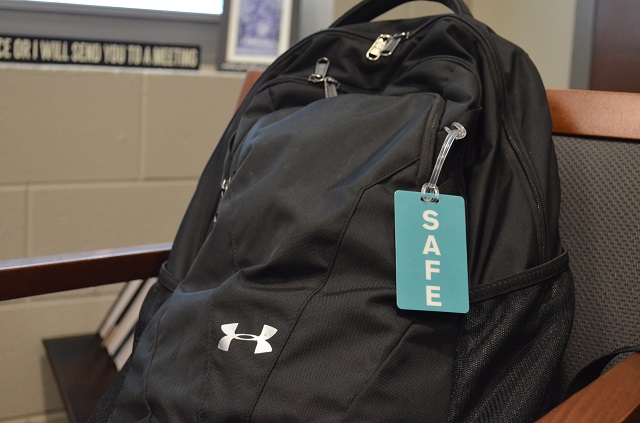
CULLMAN, Ala. – A new mental health initiative was put into place at Cullman High School Thursday to help with issues that some students face on a daily basis. “SAFE” tags with contact information for a crisis hotline were provided to each student to use whenever they feel the need to talk to an advocate.
Mental health has become a focus for the administration over the last several years and CHS Assistant Principal of Student Affairs Aaron Sparks went to Principal Kim Hall with some funding ideas for the tags and says tackling mental health issues with students has become a daily concern for the administration.
“When working with students we are constantly dealing with new issues they are facing in today’s world,” Sparks said. “I approached (Hall) about it and I started writing a couple different grants to explore funding options. I asked her about a possible donor, and she had some ideas. That’s kind of how it came about.”
Hall echoed Sparks’ sentiments, saying mental health issues have become a daily concern for them. As a result, Hall and the administration have been looking for new ways to combat the problem.
“When Mr. Sparks mentions the mental health concerns we deal with, it’s really on a day-to-day basis now. Over the past four or five years, we’ve seen a real increase with students struggling with anxiety, depression and mental health in general,” Hall said. “So, we’ve been searching for ways to try to help. We are educators, and we also look to make students’ lives better in any way we can.”
The donor that Hall had in mind was directly impacted by the effects of mental illness and Hall saw the impact this had on their family, her own family, the community and Cullman High School. The donor was more than willing to help and agreed to purchase these tags so that every student is able to have one. The tags provide a resource for students to use if they ever need it or if they know someone else who might need it.
“The ‘SAFE’ tags give students a number to contact for help in a crisis situation, whether it’s abuse, anxiety or depression,” Hall said. “Although every student doesn’t need this kind of support every day, our message is for students to keep the tag as a tool for themselves or a friend or family member.”
Outside of the new tags being given to the students, CHS has taken other proactive steps to try to help students. This year’s schedule has time built in that allows teachers and counselors more opportunities to check in on students and help with problems they may be dealing with.
“We have implemented a new Bearcat Enrichment schedule that adds a period each day for students to have an advocate for them here on campus. Each student has a teacher that works with them each day. The teachers check their grades and attendance, but they’re also making sure to check on them and see how they’re doing to see if they need any help,” Hall said. “Also, throughout Bearcat Enrichment, we’ve implemented a ninth-grade orientation where our administrators, guidance counselors, school resource officers, school nurse and librarian are going in to lead character and wellness lessons. Our counselors are getting into the classrooms, getting to know the kids and providing opportunities to connect and help as well. We’ve restructured a lot of things to try and address the need for emotional support in our student body.”
Every student is receiving a “SAFE” tag this year and the plan going forward is to provide them to each incoming freshman class as long as the program remains active. One of the things that the administration is excited about is the fact that the “SAFE” tag doesn’t expire when students graduate high school. Current students will be able to keep this resource after school is over.
“The good thing about this is it doesn’t end when you graduate. They can take it off to college with them and it’s a resource they’ll have as long as this program is active. Once they graduate high school, they’re not done with it,” Sparks said. “They can take it with them, and being a freshman in college there’s all kinds of things kids have to deal with. A lot of the studies I read said most crisis situations happen between 8 p.m. and 2 a.m. when there may not be someone they can talk to like a counselor or a teacher or whoever. So, the idea is that students will have someone to talk to even when they feel they are alone.”
Copyright 2019 Humble Roots, LLC. All Rights Reserved.



















